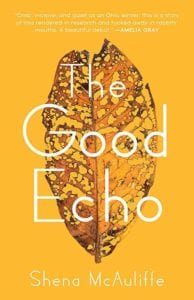
About the Book:
Winner of the The Big Moose Prize and the Balcones Fiction Prize. Set in the 1930s, and spanning the globe, THE GOOD ECHO is the story of a marriage between controversial nutritionist and dentist Clifford Bell, and his quietly courageous wife Frances. After their young son dies from surgery Clifford performs, the two seek to escape their grief through unconventional means, traveling from Ohio to Sudan, to substantiate a theory of which Clifford’s colleagues are skeptical. Narrated in turn by Frances and Clifford, and by the ghost of their son Benjamin, THE GOOD ECHO is composed of postcards and bedtime stories, folktales and family legends, travel and research notes. THE GOOD ECHO celebrates the healing that can arise through sustained curiosity, and how our deepest sadness sometimes initiates the boldest adventures of our lives.
Read an Excerpt:
Featured In June/July 2019 Issue: Summer Reads
“First, Cleveland. City of my birth, city of my death. City of brick and ice and buzzing streetcars. Sausages and perch, tornadoes and rain. City of the winding Cuyahoga, the long gray shore of Lake Erie, steel bridges pivoting. Factories purling steam into a white sky.
I am—I was—Benjamin Donald Bell, child of Clifford and Frances Bell. I died of sepsis from an infected root canal. My father was my dentist. For now, I won’t muddle through the logic of language arranged by a ghost. For now, simply this: death has made a storyteller of me.
Second, a lake named Mazinaw or Massanoga or Bon Echo, depending on who you ask. A few years before my birth, my parents built a lodge deep in the Ontario forest, looking north at The Narrows. Long before I was born in 1903, the Ojibwe and Algonkian had been corralled into reservations or dragged away to anywhere else. Their children were sent to schools near the cities, sent to be educated by Anglicans and Methodists, taught to believe in Jesus and English and arithmetic so they might forget their parents and grandparents, the ways of their people. But the lake remained a quiet place, inhabited by fishermen and vacationers and pilgrims who went to listen to the echo that bounces from the rock, a tremendous wall of granite that rises 100 meters from the surface of the water,
marked with drawings in ochre and iron, its holes and divots stuffed with sap and scratched with stories. People have always gone to the lake to listen.
Lake Mazinaw: home to mosquitoes, blackflies, gnats, frogs, fish, muskrats, rabbits, deer, turtles, black bears, and wolves. It is still a wild place, and wildness is what my parents loved about it—what I loved about it. In summer, boys still jump from the rock—something I wasn’t allowed to do. When you’re thirteen, my mother said, but I was never thirteen. Girls, too, jump from the rock, in rubberized sandals and jeans cut short and fraying, their hair tangled with sun and lake water.”
